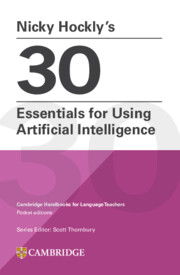D - Self-development and AI
Published online by Cambridge University Press: 22 November 2024
Summary
In this final section, we first consider the effects generative AI can have on teachers’ and learners’ wellbeing. We then explore what research has shown to be effective strategies for improving teaching and learning. We consider how these strategies can be applied to AI.
26 Considering wellbeing and AI
27 Carrying out action research into AI
28 Developing learner autonomy with AI
29 Developing your teaching with AI
30 What does the future hold?
Considering wellbeing and AI
Teachers’ and learners’ wellbeing – and how to support it – is widely discussed in the field of ELT. Supporting wellbeing in the face of generative AI is newer territory for us, and here we consider how this might be approached.
Fears about AI
In early 2023, I started to notice a trend at the English language teacher conferences I attended. The rise of generative AI, particularly in its first widely known incarnation as ChatGPT, seemed to elicit two main responses from teachers. Some teachers welcomed how generative AI was saving them time with lesson planning and admin-related work (see 7). Other teachers were much more circumspect, and some teachers were frankly unnerved. At the end of my own conference talks on AI in ELT, teachers frequently asked me two questions. The first question was whether I thought that AI would replace them. The second question was whether AI would be used by learners to cheat on their homework (see 21 for my response to that). Both questions reveal deep uncertainties about our role as teachers.
Concern, and even fear, are not uncommon responses to new technologies (see 26). Generative AI has been perceived as threatening, not just by teachers but by society as a whole. Much debate continues to take place among philosophers, scientists and politicians about just how much of an existential threat generative AI might pose to humankind. You are likely to be aware of these debates and you may have listened to some of them, oscillating between fear and hope depending on who was being interviewed. The truth is, that at the time of writing this book, we are unsure of what the long-term (and even the short-term) effects of generative AI will be on us, and this can provoke a feeling of unease.
- Type
- Chapter
- Information
- Nicky Hockly’s 30 Essentials for Using Artificial Intelligence , pp. 103 - 123Publisher: Cambridge University PressPrint publication year: 2024

